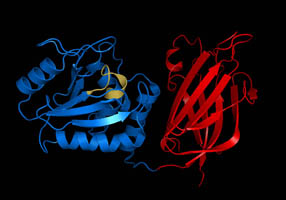Bannayan–Riley–Ruvalcaba syndrome
Editor-In-Chief: Prab R Tumpati, MD
Obesity, Sleep & Internal medicine
Founder, WikiMD Wellnesspedia &
W8MD medical weight loss NYC and sleep center NYC
| Bannayan–Riley–Ruvalcaba syndrome | |
|---|---|

| |
| Synonyms | Bannayan–Zonana syndrome, Riley–Smith syndrome, Ruvalcaba–Myhre–Smith syndrome |
| Pronounce | |
| Specialty | Medical genetics |
| Symptoms | Macrocephaly, lipomas, hemangiomas, pigmented macules on the glans penis |
| Complications | N/A |
| Onset | Childhood |
| Duration | Lifelong |
| Types | N/A |
| Causes | Mutations in the PTEN gene |
| Risks | |
| Diagnosis | Genetic testing, clinical evaluation |
| Differential diagnosis | Cowden syndrome, Proteus syndrome, Neurofibromatosis type I |
| Prevention | |
| Treatment | Symptomatic treatment, surgical removal of lipomas |
| Medication | |
| Prognosis | Generally good with management |
| Frequency | Rare |
| Deaths | |
Bannayan–Riley–Ruvalcaba syndrome (BRRS) is a rare overgrowth syndrome and hamartomatous disorder with a wide spectrum of phenotypic expression. It is characterized by macrocephaly, intestinal polyposis, lipomas, and pigmented macules of the glans penis.
Signs and Symptoms[edit | edit source]
BRRS is characterized by a variety of symptoms, including macrocephaly, intestinal polyposis, lipomas, and pigmented macules of the glans penis. Other symptoms may include developmental delay, thyroid problems, and an increased risk of certain types of cancer.
Causes[edit | edit source]
BRRS is caused by mutations in the PTEN gene. This gene provides instructions for making a protein that is involved in cell signaling and regulation of cell growth. Mutations in the PTEN gene disrupt the protein's function, leading to uncontrolled cell growth and division.
Diagnosis[edit | edit source]
Diagnosis of BRRS is based on clinical features and can be confirmed by genetic testing for mutations in the PTEN gene.
Treatment[edit | edit source]
Treatment for BRRS is symptomatic and supportive. It may include regular monitoring for the development of tumors and other complications.
Prognosis[edit | edit source]
The prognosis for individuals with BRRS varies. Some individuals may have mild symptoms and a normal lifespan, while others may have severe complications and a shortened lifespan.
See Also[edit | edit source]
References[edit | edit source]
Search WikiMD
Ad.Tired of being Overweight? Try W8MD's physician weight loss program.
Semaglutide (Ozempic / Wegovy and Tirzepatide (Mounjaro / Zepbound) available.
Advertise on WikiMD
|
WikiMD's Wellness Encyclopedia |
| Let Food Be Thy Medicine Medicine Thy Food - Hippocrates |
Translate this page: - East Asian
中文,
日本,
한국어,
South Asian
हिन्दी,
தமிழ்,
తెలుగు,
Urdu,
ಕನ್ನಡ,
Southeast Asian
Indonesian,
Vietnamese,
Thai,
မြန်မာဘာသာ,
বাংলা
European
español,
Deutsch,
français,
Greek,
português do Brasil,
polski,
română,
русский,
Nederlands,
norsk,
svenska,
suomi,
Italian
Middle Eastern & African
عربى,
Turkish,
Persian,
Hebrew,
Afrikaans,
isiZulu,
Kiswahili,
Other
Bulgarian,
Hungarian,
Czech,
Swedish,
മലയാളം,
मराठी,
ਪੰਜਾਬੀ,
ગુજરાતી,
Portuguese,
Ukrainian
Medical Disclaimer: WikiMD is not a substitute for professional medical advice. The information on WikiMD is provided as an information resource only, may be incorrect, outdated or misleading, and is not to be used or relied on for any diagnostic or treatment purposes. Please consult your health care provider before making any healthcare decisions or for guidance about a specific medical condition. WikiMD expressly disclaims responsibility, and shall have no liability, for any damages, loss, injury, or liability whatsoever suffered as a result of your reliance on the information contained in this site. By visiting this site you agree to the foregoing terms and conditions, which may from time to time be changed or supplemented by WikiMD. If you do not agree to the foregoing terms and conditions, you should not enter or use this site. See full disclaimer.
Credits:Most images are courtesy of Wikimedia commons, and templates, categories Wikipedia, licensed under CC BY SA or similar.
Contributors: Prab R. Tumpati, MD


